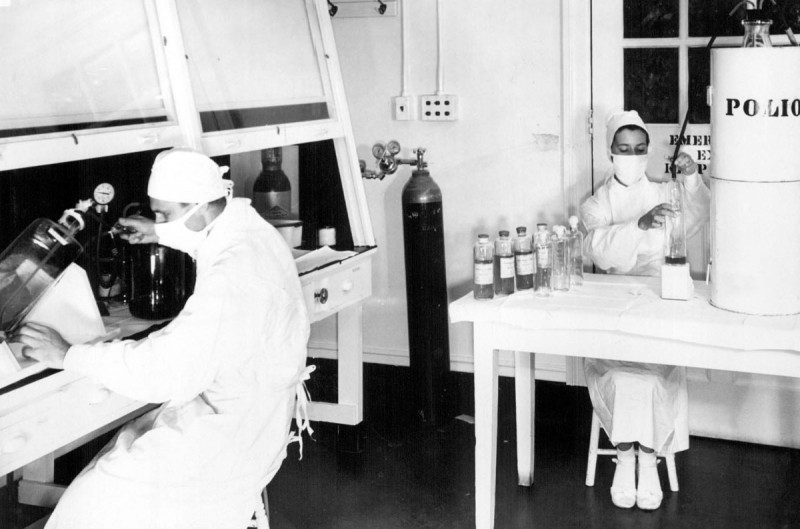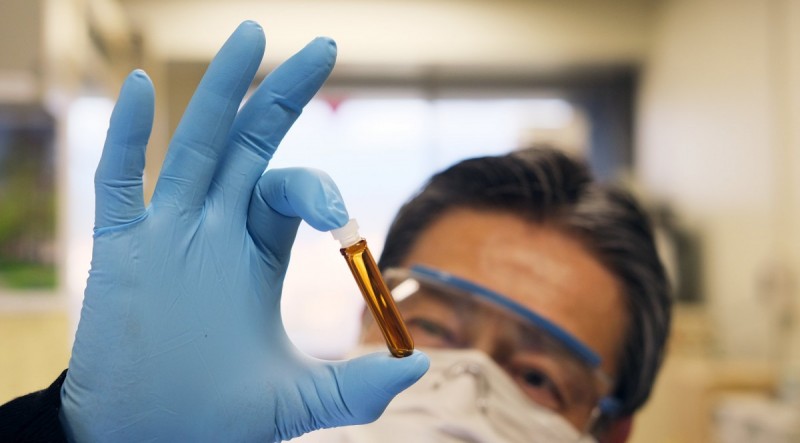Make the vaccines public

The vaccine shortage is an example of how the private sector has failed to protect us during a crisis. Photo from Flickr.
Jason Kenney is frustrated. Standing at a podium for a January 18 press conference about Alberta’s vaccination strategy, he said the shipments of COVID-19 vaccines from Pfizer and Moderna aren’t coming fast enough.
“The shipments we’ve received do not match the pace at which we’re able to vaccinate Albertans,” he said. “I’m deeply disappointed at the situation that we are now facing.”
In a press conference which, bizarrely, also focused on Alberta’s now-failed efforts to pressure the incoming Biden administration to approve the Keystone XL pipeline, Kenney explained that the corporate suppliers of the COVID-19 vaccine are delaying supply to Canada, while increasing shipments to Europe.
As Kenney struggles with the some of the lowest approval ratings of any provincial leader in Canada, the talk of the pipeline—and an equally ham-fisted demand to impose sanctions on the United States for rejecting it—is an attempt to shore up his teetering base of support. It gives him something to talk about other than his government’s own botched COVID response, which for a time caused Alberta to have the highest count of new cases in the country.
Through the question period, no journalist asked the critical question: Why do we allow companies like Pfizer and Moderna to control our vaccine supply in the first place?
For Kenney, the answers to that question are uncomfortable. Since taking power, his United Conservative Party has been on a crusade to privatize and dismantle public services. His government announced, in the middle of a pandemic, their intention to eliminate 11,000 jobs in the healthcare sector.
But like so many aspects of this pandemic, the vaccine shortage is a clear example of how the private sector has failed to protect us during the crisis. Rather than setting its own priorities and running its own program, the Canadian government continues to chase companies such as Pfizer—which no democratic government controls. We see the results now, as health authorities cancel vaccine appointments and new cases surge across the country.
So what is the effective and fair response to the pandemic? How should we develop, produce, and distribute these life-saving vaccines? Was the shortage avoidable?
Before the privatization frenzy of the 1980s, Canada actually had its own, publicly owned vaccine research and development company. When researchers at the University of Toronto discovered insulin in 1921, Connaught Labs immediately began producing the life-saving diabetes medicine. Connaught researchers were the first to discover how to effectively scale-up production, and within a few months, the lab was supplying all Canadian diabetics with insulin at cost-price and exporting cost-price vaccines to countries without their own production facilities, like Ireland and Australia.
Connaught Labs scientists working on a polio vaccine in the 1950s. Photo courtesy of Sanofi Pasteur.
Connaught was the sole producer of the polio vaccine for Canadians, and it avoided the disastrous errors that private facilities such as Cutter Labs made when they accidentally infected thousands of children with the virus. By helping create a freeze-dried version of the vaccine, Connaught played a key role in the global campaign to eradicate smallpox, enough so that the World Health Organization designated it as the Regional Reference Centre for the Americas and the Connaught vaccine as the global standard.
Connaught became a world leader in vaccine research, production, and distribution by providing vaccines at-cost to Canadians and people around the world. Its main concern wasn’t growing rich from vaccines, but getting them as cheaply as possible to as many people as possible.
But that wasn’t good enough for the privatizers. In 1989, then Prime Minister Brian Mulroney, said that keeping industries such as Connaught in public hands “puts a Wall of China around Canada.” If Canada wanted to participate in the new globalized marketplace, then his government planned to liquidate all public assets, including Connaught Labs. which it sold in 1989 to the Institut Mérieux, a French multinational pharmaceutical company. The institution which played such a key role in public health in Canada, and worldwide, was now in private hands.
Today, Sanofi Pasteur, the company that now owns the facilities formerly known as Connaught Labs, is developing a COVID-19 vaccine—and the Canadian government has purchased 72 million doses from them. The fortune that Canadian taxpayers will spend to buy these vaccines, which could be approved in 2021, won’t finance brilliant research, but shareholder profit.
In October, the federal government announced it would invest in creating Canadian vaccine production capacity. Navdeep Bains, Minister of Innovation, Science, and Industry, announced that the Government of Canada would give $173 million to the Quebec-based vaccine research company Medicago, and buy 76 million doses of Medicago’s COVID-19 vaccine, which is still in development.
But Medicago has its own history of transferring public resources into private hands. In 1997, it was formed as a research partnership between two public institutions—Agriculture and Agri-Food Canada and Université Laval. In 1999, it incorporated as a private company. In 2013, Mitsubishi Tanabe Pharmaceuticals, a Japanese company, bought controlling shares in the firm.
Today, even though publicly-funded universities produce much of the most useful vaccine and medical research. Governments allow billionaires and their corporations to privatize that research and then sell back the results to the world and keep the profits for themselves. No one should lack medicine because of billionaires profiteering by colluding with governments. We need to cut these middlemen out of the equation entirely.
Even in the best of times, healthcare is no place for profit-making—and that’s doubly true during an unprecedented global pandemic which has killed over two million people worldwide, including nearly 20,000 Canadians. If you want to keep those death tolls from rising, makes sure that regular people can get vaccines on time. Right now, things aren’t looking great. The private companies in charge of producing vaccines don’t have the capacity to supply us, and we don’t have any other option for how to procure them.
But it didn’t need to be this way; not now or ever again. We have the capacity to create publicly owned, sustainable, and low-cost alternatives to the pharma companies that are failing us. We have the ability to create a system of production for all types of medicine that can respond to the regular health needs of Canadians and to exceptional circumstances, like those in which we’re living.
But to do that, we need to stop talking about privatization, and start talking about democratization.
Kevin Barry is a Vice-President of the Alberta Union of Provincial Employees, and the Chair of the union’s Anti-Privatization Committee.

